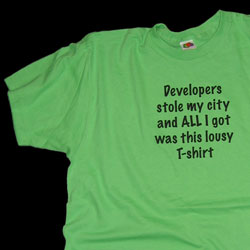City Parks
At Occidental Park in Pioneer Square over Presidents Day weekend, activists tied green ribbons to trees while Seattle Parks and Recreation fenced off the area, preparing to cut down most of the trees. On Tuesday, Feb. 21, Friends of Gas Works Park filed a lawsuit seeking to stop the Parks Department from allowing One Reel to locate Summer Nights concerts at the park. And on Saturday morning, Feb. 25, at 8:30, activists from a variety of neighborhood groups will gather at the south entrance of Woodland Park Zoo to march and protest against the Parks Department. What do all these neighborhood groups have in common? They all accuse the department, and particularly Superintendent Ken Bounds, of top-down decision-making that excludes neighborhoods from critical decisions and favors institutional and commercial interests. Besides the effort to save trees at Occidental Park and stop the concert series at Gas Works Park, current or recent controversies include the location of a new skateboard park at Lower Woodland Park, construction of a parking garage at the zoo, the daylighting of Ravenna Creek, condos in Discovery Park, and installation of artificial grass at Loyal Heights Playfield. In each case, the process has left citizen activists frustrated. “What Bounds and his guys were doing was divide and conquer,” says Jef Jaisun, president of Ravenna Park Action Council. “They’ll give us meetings and meetings and meetings, and then they’ll do what they fucking want.” GEOV PARRISH
Media
The Legislature has strengthened a proposed shield law which would protect journalists from having to reveal confidential sources and other information. State Attorney General Rob McKenna proposed a measure that would have given journalists an absolute privilege from testifying about confidential sources. Still, some journalists weren’t entirely happy, including leaders of the Western Washington chapter of the Society of Professional Journalists (SPJ). One of the sticking points concerned who would be considered a journalist. In McKenna’s definition was a provision that talked about a person who earned a “substantial portion of his or her livelihood” from journalism, which raised concerns about whether freelancers and unpaid bloggers qualified. A version passed last week by the House, however, defines a journalist, in part, as someone “earning or about to earn a substantial portion of his or her livelihood” from journalism (emphasis added). SPJ is happier but still feels “freelancers or part-time journalists are at risk,” says Marcus Donner, the organization’s treasurer. A similar bill is pending in the state Senate. NINA SHAPIRO
City Hall
Someone is finally pointedly asking exactly whom Mayor Greg Nickels’ downtown development proposal is going to serve—the rich alone, or everyone? It’s a crucial question with many of the thousands of new residences expected to fetch million-dollar prices. To that end, on Tuesday, Feb. 21, Real Change, publisher of the newspaper of the same name sold by the homeless, gave members of Seattle City Council and Nickels T-shirts proclaiming, “Developers stole my city and all I got was this lousy t-shirt.” Says Rachel Myers, a homeless advocate at Real Change: “The point of the shirt is to get their attention and let them know there is community concern about the mayor’s proposal to make downtown only welcoming to the wealthy. Seattle deserves a downtown that’s for everyone.” Real Change is also hosting a public forum on downtown development at 6 p.m. Thursday, Feb. 23, at Gethsemane Lutheran Church, 911 Stewart St. PHILIP DAWDY
Quote
“Some of the things I had to say were quite harsh, but the manager gave me the courtesy of listening intently and he especially made me feel he understood my feelings. Although the issues we talked through were tough ones, I would actually describe it as an overwhelmingly productive dialogue. So much so, in fact, that I think we achieved a new level of mutual understanding, and a far stronger manager-player relationship has emerged between us.” —Mariners right fielder Ichiro, talking about a sit-down with Manager Mike Hargrove after a disappointing 2005. (Seattle Times, Feb. 21)




